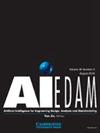The epsilon-knowledge: an emerging complement of Machlup's types of disciplinary knowledge
IF 2.3
3区 工程技术
Q3 COMPUTER SCIENCE, ARTIFICIAL INTELLIGENCE
Ai Edam-Artificial Intelligence for Engineering Design Analysis and Manufacturing
Pub Date : 2022-05-16
DOI:10.1017/S089006042200004X
引用次数: 2
Abstract
Abstract Machlup used the words alpha, beta, and gamma to identify humanities, science, and social science as three distinct fields of academic learning and knowing, in addition to general knowledge. Gilles and Paquet identified a fourth type of disciplinary knowledge and labeled it as delta. This includes the knowledge of creative disciplines such as design, law, and economy. Since the time of these road-paving works, a lot has changed. In the last two decades, various concepts and manifestations of intellectualized engineered systems have appeared. A paradigmatic feature of these systems, exemplified by smart cyber-physical systems, is that they collect, infer, or extract massive amount of synthetic system knowledge (M-SSK) based on some pre-programmed human knowledge. The amount of this type of knowledge grows continuously. It can be aggregated on system level and on system of systems level. This paper argues that this aggregated M-SSK is not covered by the abovementioned four genres of knowledge. In fact, it represents a new genre. The conducted literature study underpins this claim. Therefore, the paper suggests dealing with it as a new genre, called epsilon-knowledge. Artificial intelligence, system engineering, cyber-physical systems, and knowledge engineering are the disciplines dealing with epsilon-knowledge. The paper refers to sympérasmology as the proper conceptual framework of studying this genre of knowledge.epsilon知识:Machlup的学科知识类型的一个新兴补充
摘要Machlup使用单词alpha、beta和gamma将人文科学、科学和社会科学确定为学术学习和认识的三个不同领域,以及一般知识。Gilles和Paquet确定了第四类学科知识,并将其标记为delta。这包括设计、法律和经济等创造性学科的知识。自从这些道路铺设工程以来,情况发生了很大变化。在过去的二十年里,智能化工程系统的各种概念和表现形式已经出现。以智能网络物理系统为例,这些系统的一个典型特征是,它们基于一些预先编程的人类知识收集、推断或提取大量的合成系统知识(M-SSK)。这类知识的数量在不断增长。它可以在系统级和系统中系统级进行聚合。本文认为,这种聚合的M-SSK不包括在上述四种类型的知识中。事实上,它代表了一种新的流派。进行的文献研究支持了这一说法。因此,本文建议将其作为一种新的类型来处理,称为epsilon知识。人工智能、系统工程、网络物理系统和知识工程是处理epsilon知识的学科。本文将符号学作为研究这类知识的恰当概念框架。
本文章由计算机程序翻译,如有差异,请以英文原文为准。
求助全文
约1分钟内获得全文
求助全文
来源期刊
CiteScore
4.40
自引率
14.30%
发文量
27
审稿时长
>12 weeks
期刊介绍:
The journal publishes original articles about significant AI theory and applications based on the most up-to-date research in all branches and phases of engineering. Suitable topics include: analysis and evaluation; selection; configuration and design; manufacturing and assembly; and concurrent engineering. Specifically, the journal is interested in the use of AI in planning, design, analysis, simulation, qualitative reasoning, spatial reasoning and graphics, manufacturing, assembly, process planning, scheduling, numerical analysis, optimization, distributed systems, multi-agent applications, cooperation, cognitive modeling, learning and creativity. AI EDAM is also interested in original, major applications of state-of-the-art knowledge-based techniques to important engineering problems.

 求助内容:
求助内容: 应助结果提醒方式:
应助结果提醒方式:


